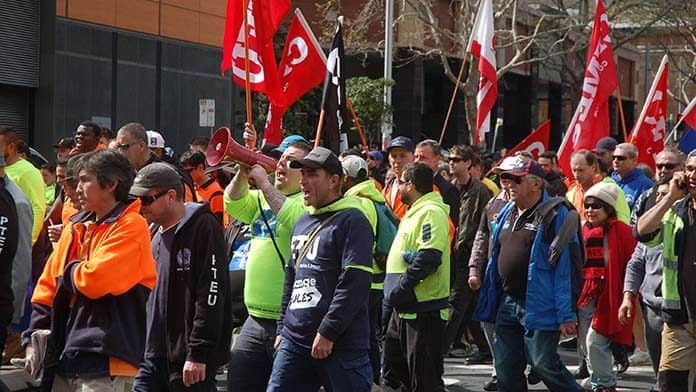Scott Morrison’s first move since the election has been to lock in massive tax cuts for the rich.
A few deals to secure the support of crossbench Senators were enough to see it go through.
The plan will eventually introduce a regressive flat tax system where everyone earning between $45,000 and $200,000 pays the same rate of tax. The Australia Institute found that the majority of the tax cuts (54 per cent) go to the top 20 per cent of income earners. It has called the changes a “radical attack on Australia’s progressive tax system”.
Those earning over $180,000 will receive $77 billion in tax cuts over ten years.
This will also mean cuts to government spending over time. The Grattan Institute estimates that it means $40 billion a year less in spending by 2029-30.
Instead of exposing this as a handout for the rich and an attack on services, Labor focused its objections on saying the third stage was “unaffordable” and that it was “economically irresponsible” to lock them in so far into the future.
After its election defeat Labor continues to drift to the right, walking away from any attack on the rich. It was petrified of being blamed for denying anyone a tax cut.
Labor leader Anthony Albanese even went out of his way to say he didn’t, “regard someone who’s earning $200,000 dollars a year as being from the top end of town”.
After it was clear the tax cuts were going to pass anyway, Labor dropped its opposition and helped vote them through. Caving in has compromised Labor’s credibility as a voice for workers and the poor.
The Coalition is now preparing further attacks. First up is its “Ensuring Integrity Bill”, which would allow them to ban any union leader from their position, even for minor breaches of Fair Work Act around filing documents. Unions could also be deregistered or face serious interference in how they run.
These new powers are aimed at the CFMEU in particular and are an effort to undermine effective trade unionism and militancy.
Minister Christian Porter has also announced a review of industrial relations laws designed to lay the ground for more anti-union and anti-worker laws.
The bosses have set out a wish list of changes, including amending unfair dismissal laws to make it easier to sack people, and watering down the “better off overall test” for enterprise agreements that was used to strike down deals that removed penalty rates for casual workers at Coles and Woolworths.
Innes Wilcox from the Australian Industry Group and the mining association’s Steve Knott have detailed a six point plan and called for a, “conversation about serious economic reform”.
Hard right demands
The hard right inside the Coalition are still out campaigning for religious freedom legislation and more coal-fired power stations.
The suggestion from Indigenous Affairs Minister Ken Wyatt that some unspecified kind of Indigenous Voice might eventually be introduced led to howls of outrage across the Coalition.
Senators Keith Pitt and James McGrath want an inquiry into the use of nuclear power in Australia. They have been backed by Barnaby Joyce, who says it is the only way to get to zero emissions (while at the same time declaring concern about climate change is “barking mad”.)
Nuclear power is far too expensive and far too dangerous as a replacement for coal. But the debate is a way to distract attention from the massive expansion in renewable energy we need.
There is a growing rebellion for action on climate change. Extinction Rebellion groups have been launched across the country, inspired by the action that shut down central London.
But the major focus for action will be the next high school Strike for Climate on 20 September.
This time the students are calling on workers and unionists to walk out of work to join them. Already the NTEU at universities in Melbourne and Sydney have committed to joining the action.
The election was a wakeup call for the climate movement. Workers in coal mining areas in Queensland swung towards the Coalition because climate action was seen as a threat to jobs.
Supporting workers’ demands and fighting for climate jobs can help to overcome this—and draw in the union power the climate movement needs to force change.
The support for workers at DP World from high school Climate Strikers is an important step in the right direction.
Members of the MUA at DP World port terminals are staging ongoing strike action against outsourcing and job cuts.
Everyone should support their struggle. We need the largest possible turnout of workers and students on the September climate strike.
And we need a fighting union movement prepared to stage strike action to defeat the Liberals’ and the bosses’ attacks.






